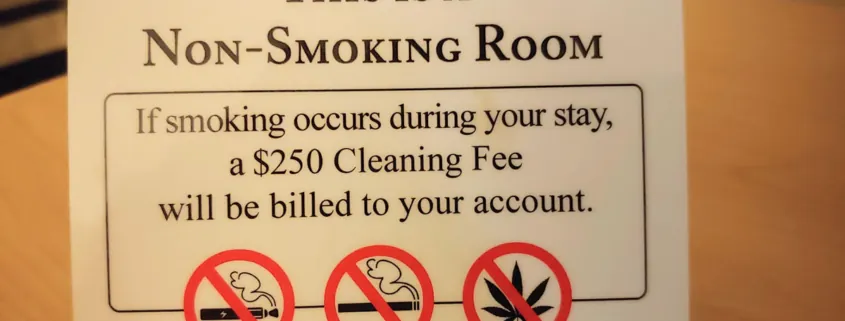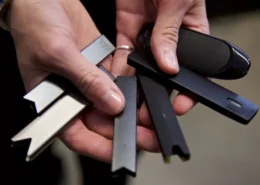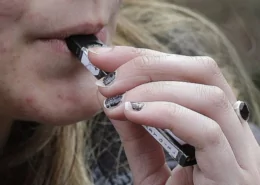Vaping in Hotels: Can They Detect It and What Are the Consequences?
E-cigarettes have become an increasingly popular alternative to traditional smoking, particularly among younger generations. However, many establishments, including hotels, have strict policies regarding smoking and vaping. While some hotels provide designated smoking areas, others have completely banned smoking and vaping inside their premises. This leaves many vapers wondering, “Can hotels tell if you vape in your room?” Let’s explore the various ways hotels can detect vaping and the potential consequences of breaking their rules.
How Hotels Detect Vaping in Rooms
Despite the fact that vaping is often considered a cleaner alternative to smoking, hotels often treat the two activities equally. Many of the smoking prohibitions that have been in place for decades now extend to vaping as well. Hotels can detect vaping in rooms through several methods, including:
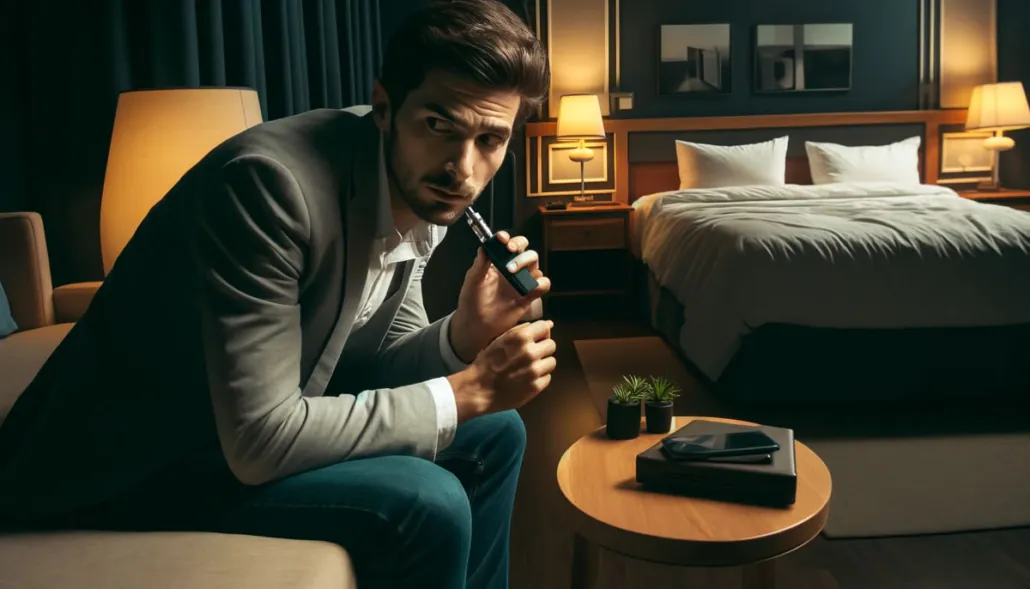
1. Scent Detection
Although some vapes are designed to be odorless and the vapor dissipates within a few hours, hotel staff can still detect the smell of vaping long after the activity has taken place. The flavoring from the vape clouds can linger on towels, bedding, carpets, and curtains, making it easy for staff to identify the distinctive aroma when cleaning the room.
The type of vaping device used can also impact the detectability of the scent. While taking a few puffs from a disposable vape may go unnoticed, using a large sub-OHM device is much more likely to leave a noticeable odor. Additionally, vaping cannabis products containing THC or CBD can produce a strong, recognizable smell that can lead to trouble, especially in countries where marijuana remains illegal.
Some luxury hotels even employ air quality monitoring systems that can precisely identify the presence of chemicals found in vape smoke, ensuring a safe and comfortable environment for all guests.
2. Visual Evidence
Another way hotel staff can detect vaping in a room is through visual evidence. While e-cigarettes don’t leave behind traditional smoking signs like ash, cigarette butts, or burn marks on furniture, a thorough inspection of mattresses and bedding can reveal signs of vaping.
Staff may also notice the sticky residue left behind by vaping, as the propylene glycol and vegetable glycerin from the vape juice can settle on mirrors, bedside tables, and windows.
3. Video Surveillance
Many hotels use video surveillance systems in public areas, and in rare cases, even inside rooms. While the primary purpose of these cameras is to enhance security, they can also provide evidence of guest behavior, including vaping in prohibited areas.
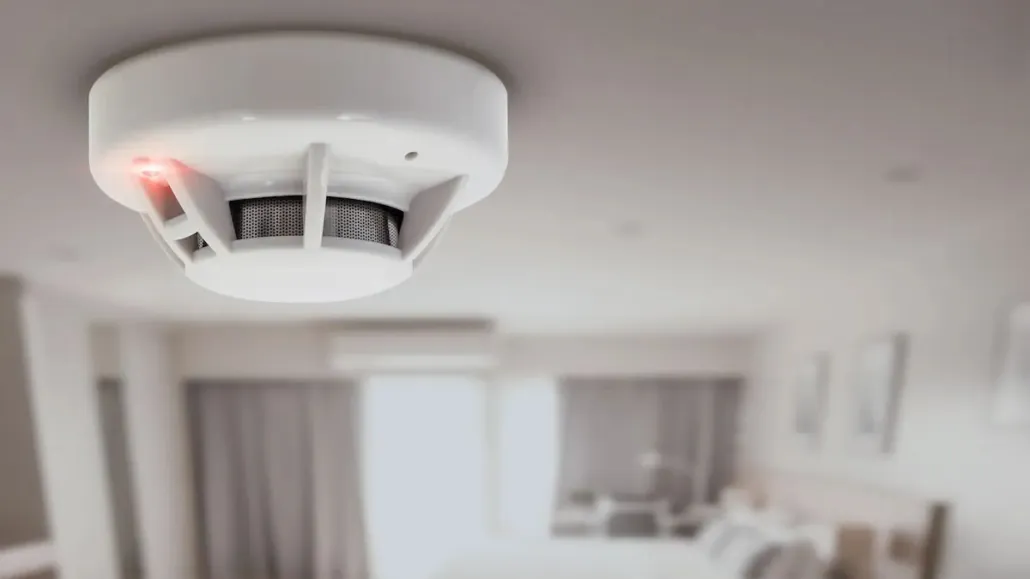
4. Vape (Smoke) Detectors
Contrary to popular belief, smoke detectors can indeed detect vaping vapor. Many countries require hotels to install smoke detectors in their rooms, and the activation of these alarms can indicate that someone is smoking or vaping inside.
Hotels can choose between two types of smoke detectors:
- Particulate detectors: These devices detect smoke particles that cause ionized air to appear after combustion. They are primarily effective for detecting traditional smoking.
- Sensor detectors: These devices use light beams to detect smoke and are equally effective in detecting both cigarette smoke and vape clouds.
Some hotels install sophisticated smoke detectors that incorporate both systems, making it nearly impossible for guests to determine the type of alarm and its sensitivity level.
Avoiding Getting Caught While Vaping in a Hotel
The most effective way to avoid getting caught vaping in a hotel is to adhere to the establishment’s rules. However, if you still choose to take the risk, it’s essential to understand the potential consequences of your actions.
1. Research the Hotel’s Vaping Policy
Before booking a hotel, take the time to research their specific rules regarding vaping. Choose accommodations that allow vaping to enjoy your stay without the fear of penalties. If the hotel you prefer prohibits vaping, it’s likely due to two primary reasons:
- Health considerations: Hotels, especially luxury establishments, strive to protect their reputation by prioritizing their guests’ well-being. Second-hand smoke, whether from traditional cigarettes or vapes, can be harmful. E-cigarettes produce aerosols that can affect the respiratory system by releasing potentially toxic chemicals.
- Maintenance costs: Vaping devices produce a residue that leaves a sticky film on furniture and glass surfaces. Removing this residue requires specialized cleaning techniques and products, increasing the hotel’s maintenance costs. Hotels are unlikely to compromise their profits and reputation for the sake of a guest’s vaping enjoyment.

2. Use Low-Vapor Products
If you insist on vaping in a hotel room despite the rules, consider using e-cigarettes and vapes that produce minimal vapor or smoke. Low-powered vape kits, such as the SPIRITBAR Katana, generate a low cloud level. Additionally, opting for e-liquids with a high PG content can help reduce vapor production.
3. Tampering with Smoke Alarms (Not Recommended)
Some vapers may attempt to disable or tamper with smoke alarms to avoid detection. However, this practice is strongly discouraged for several reasons:
- Turning off the smoke alarm: This action can compromise the safety of all hotel guests and staff. Modern systems can quickly detect any changes made to these devices, and getting caught can result in fines ranging from $150 to $300. In some regions, you may even face jail time for endangering public safety.
- Covering the smoke alarm: Placing a shower cap or stretching a sock over the smoke detector can prevent it from detecting vape clouds. However, this method is dangerous and can hinder the device’s ability to function properly in the event of a real fire. Are you willing to be responsible for the injuries or deaths of other guests due to your desire for instant gratification?
- Other methods: While some vapers may attempt to open windows, vape on balconies, use the bathroom, or try the shower steam method, none of these techniques are foolproof, and all come with their own risks.
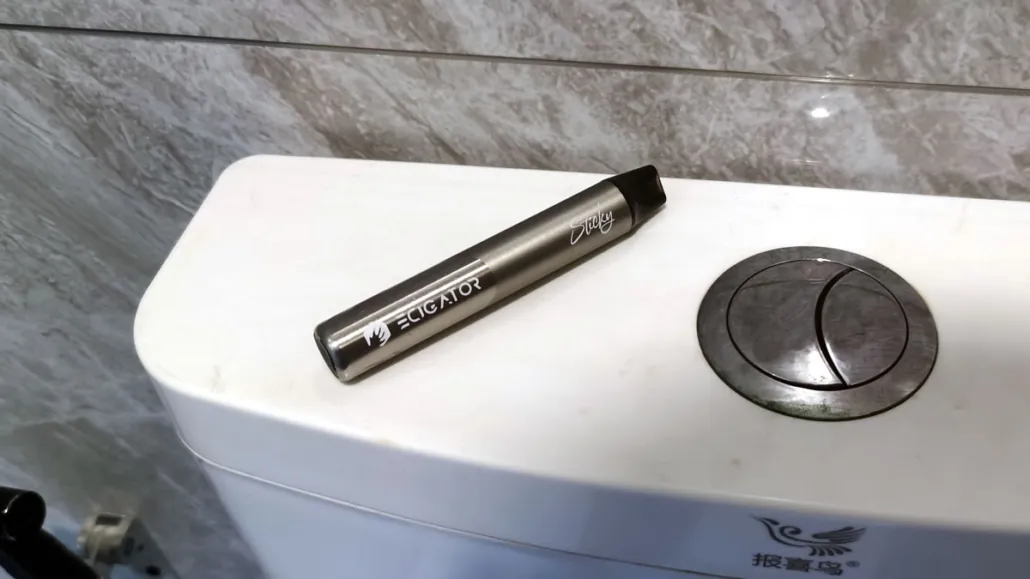
Frequently Asked Questions
1. Is Vaping Allowed in Hotels?
Vaping is only permitted in hotels that explicitly allow smoking or have designated smoking rooms. If a room or hotel has a no-smoking policy for tobacco, it typically extends to vaping as well. However, it’s always best to check with the hotel management for clarification.
Many hotels have implemented smoking policies and fines to discourage vaping. If you are caught vaping, expect to pay a fine ranging from $150 to $250 or more, depending on the hotel’s specific policy.
2. What Are the Consequences of Illegal Vaping and Tampering with Fire Protection Equipment?
In addition to fines and unpleasant encounters with hotel management, tampering with fire protection equipment can lead to legal consequences, including jail time. Penal Codes vary by state in the U.S., so fines and punishments may differ.
Smoking in a non-smoking area is considered a misdemeanor. In Las Vegas, for example, it can result in six months of jail time and a fine ranging from $500 to $1,000.
Tampering with smoke alarms in a hotel, causing them to malfunction, is a serious offense considered a felony. If your actions lead to injuries or fatalities, you will be held liable for the consequences.
Conclusion
Although vaping is often considered a safer alternative to smoking, many hotels treat the two activities equally and have strict policies against both. To avoid unpleasant surprises and costly fines, always check the hotel’s rules regarding vaping before booking your stay.
Keep in mind that hotel staff can detect vaping through various means, including scent, visual evidence, video surveillance, and smoke detectors. Attempting to circumvent these measures is not only against the rules but can also endanger the safety of other guests.
To ensure a stress-free and enjoyable hotel experience, it’s best to respect the establishment’s policies and only vape in designated areas or choose accommodations that explicitly allow vaping.
- Austria Plans to Ban Disposable E-Cigarettes - August 5, 2025
- Vaping vs. THC Drinks: Which Cannabis Option Is Right for You? - August 4, 2025
- Colombia’s New Vape Law: A Reality Check on Enforcement - August 4, 2025

